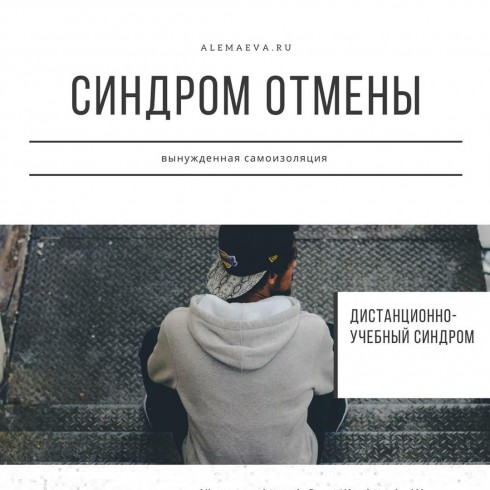Withdrawal Syndrome: Forced Isolation
Withdrawal syndrome is familiar to people who quit smoking, drugs or medicine.
But what if we look at how the withdrawal syndrome will affect children who, following the results of forced self-isolation, will have to return to their previous educational format?
Briefly describe what the withdrawal syndrome is - this is the body’s reaction to the abolition of intensive use or a significant decrease in the use of drugs, psychoactive substances, etc. And the main types of such a syndrome: medicine, drug, nicotine, alcohol and harmonic.
I propose to speculate on a new form, which everyone will soon have to get acquainted with “distance learning”.
Today that precedes the distance-learning withdrawal syndrome. 5 stages:
1. The child relaxes.
A teacher for a student is an authority. He has his own methods of encouragement and punishment, which are expressed in a rating scale.
The parents for the child is authority. And they has theirs own methods.
Responsibilities are divided. The student is used to expecting a reaction to their actions or inaction from parents or teachers in a different manner. But all of a sudden everything is mixed up.
The student finds himself in a home environment, a bay of calm and rest after school. Each element of the interior (sofa, bed, armchair, TV, dining table) has a stable and developed over the years association with relaxation. Sitting on the couch - your hand reaches for the phone, lying on the bed - you fall asleep, sit down at the dinner table - your appetite increases. In this space, no one evaluates your actions on a 5-point system. Around are parents and other relatives, the basic principle of which is “Unconditional love”. And the child relaxes, because it should be so.
2. The child gets used to it.
Not one member of the family can immediately be rebuilt. Because for all participants it is a shock and lack of experience. Parents continue to go to work and solve pressing problems. Their schedule did not include more free time and less responsibilities. Therefore, they expect that their child will adapt and, moreover, will retain their previous impulse to learn. And this does not happen. And while it turns out what is wrong and how to deal with it, several days pass. And during this time the child gets used to it.
3. The child resists
And so, parents begin to take matters into their own hands. They have no pedagogical and psychological education, they have no idea about the system of motivation in education, in their eyes looming requirements for subjects with a deadline of several hours. Therefore, they use the arsenal of funds that are in stock. Each has its own.
But this arsenal is not suitable for training purposes. It’s like if you come to Italy and try to charge the phone with Russian charging. The plug and socket do not fit together, no matter how hard you try to push it there. And the child resists.
4. You find a compromise.
At some point, the parents realizes that they are not omnipotent. This is expressed in different ways: from “it is the duty of the teacher” to “above all my love for the child.” And the adaptation stage begins. Whether it is reducing the load, if possible, helping the child with lessons, redistributing time for study / rest (often in favor of the first), the use of child care, etc. Bilateral compromise. Because each side (parent, child) wants to survive in this situation, and just go through difficult times.
5. And finally, the last stage is cancellation.
It is time to end this forced isolation mode. And in the current situation, these are two scenarios:
5.1. The school year ends and the child goes on vacation.
5.2. The child returns to the walls of the school in the previous regime.
What happens next, read in the next article.
